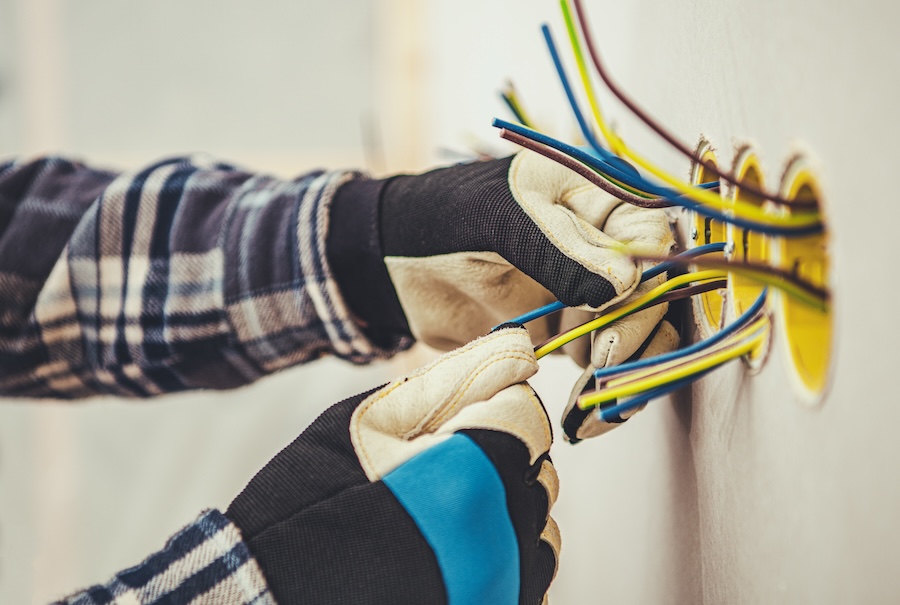Case Study: Brandon Blais Electric
- July 9, 2024
- AlexSmootCEO
- 0

Table of Contents
Our partner company, Sweat Venture, interviewed Brandon Blais—owner of Brandon Blais Electric. With a masters electrician license and six years under his belt, Brandon’s business is booming—and he has incredible reviews to prove it.
An electrical business specializes in the installation, maintenance, and repair of electrical systems for residential, commercial, and industrial properties. These businesses provide expertise in wiring, lighting, electrical panel upgrades, and troubleshooting electrical issues—ensuring that electrical systems are safe, efficient, and up-to-code. They often offer additional services such as energy efficiency consultations, smart home installations, and emergency electrical repairs to keep properties powered and safe throughout the year.
Are you thinking about starting an electrical business? If so, consider these takeaways from our interview with Brandon…
Electrical businesses may provide a variety of services to ensure that electrical systems are safe, efficient, and enhance the overall functionality and value of a property. The most common services offered include:
- Wiring and rewiring: Installing and updating electrical wiring to ensure safety and compliance with current codes.
- Lighting installation: Setting up interior and exterior lighting fixtures to improve visibility and aesthetics.
- Electrical panel upgrades: Upgrading electrical panels to handle increased power demands and enhance system safety.
- Troubleshooting and repair: Diagnosing and fixing electrical issues to restore functionality and safety.
- Energy efficiency consultations: Advising on and implementing energy-saving measures to reduce electricity consumption.
- Smart home installations: Setting up smart devices and systems for home automation and improved energy management.
- Emergency electrical repairs: Providing rapid response services for urgent electrical issues to prevent hazards.
- Circuit breaker replacements: Replacing faulty circuit breakers to ensure reliable power distribution.
- Outlet and switch installation: Installing and upgrading electrical outlets and switches for better functionality.
- Surge protection: Implementing surge protection solutions to safeguard appliances and electronics from power surges.
- Generator installation and maintenance: Installing and servicing generators to provide backup power during outages.
- Smoke and carbon monoxide detector installation: Ensuring safety by installing and maintaining detectors throughout the property.
- Ceiling fan installation: Installing ceiling fans to improve air circulation and energy efficiency.
- Electrical safety inspections: Conducting thorough inspections to identify potential hazards and ensure code compliance.
- Appliance installations: Connecting and setting up major appliances to ensure they operate safely and efficiently.
- Landscape lighting: Installing outdoor lighting to enhance the nighttime aesthetics and security of the property.
- Electrical system design: Creating tailored electrical plans for new constructions and renovations.
- Commercial electrical services: Providing specialized services for commercial properties, including maintenance and upgrades.
- Renewable energy installations: Setting up solar panels and other renewable energy systems to promote sustainable energy use.
- Underground electrical services: Installing and repairing underground electrical systems for improved reliability and aesthetics.
- Industrial electrical services: Offering comprehensive electrical solutions for industrial facilities, including machinery wiring and maintenance.
Each service is designed to ensure that electrical systems not only operate safely and efficiently but also enhance the overall functionality and value of properties, providing clients with reliable and optimized electrical solutions for years to come.

What Equipment is Needed?
The owner of an electrical business might want to consider this equipment:
- Multimeters and testers: Essential for measuring voltage, current, and resistance to ensure circuits are functioning correctly.
- Wire strippers and cutters: Used to strip insulation from wires and cut them to the required lengths.
- Pliers and screwdrivers: Basic hand tools necessary for various electrical tasks—including gripping, bending, and turning.
- Drills and drill bits: Needed for making holes in walls, floors, and ceilings to run wiring.
- Conduit benders: Used to shape conduits that protect and route electrical wiring.
- Fish tapes and rods: Tools for pulling wires through conduits and other spaces.
- Labeling machines: Important for marking wires, panels, and other components for easy identification and organization.
- Safety equipment: This typically includes insulated gloves, safety glasses, ear protection, and sturdy boots. Depending on the work environment, additional protective gear such as hard hats and respirators may be necessary.
- Ladders and scaffolding: Essential for reaching high places when installing or maintaining electrical systems.
- Voltage detectors: Devices for safely detecting live wires and ensuring circuits are de-energized before work begins.
- Tool belts and bags: Convenient for carrying and organizing tools on the job site.
- Cable pullers: Equipment for installing heavy or long lengths of cable in buildings and industrial settings.
- Conduit and cable cutters: Used for cutting various types of conduit and large cables to size.
- Circuit finders: Tools for locating circuit breakers or fuses corresponding to specific outlets or fixtures.
- Portable generators: Useful for providing temporary power on job sites without electricity.
- Power saws: Needed for cutting through materials like drywall or wood to install electrical components.
- Heat guns: Used for heat-shrinking tubing and other applications requiring controlled heat.
- Testing and calibration equipment: Devices for ensuring the accuracy and functionality of electrical systems and components.
Each piece of equipment is selected to ensure efficient operation and high-quality results in installing, maintaining, and repairing electrical systems.

What Skills are Needed and How to Acquire Them
Running a successful electrical business requires a mix of technical expertise, safety knowledge, and business acumen. Essential technical skills include understanding electrical theory and local codes—which can be acquired through vocational training, community college courses, and apprenticeship programs. Proficiency in wiring, installation, and troubleshooting can be developed through hands-on experience and advanced training sessions. Safety practices are critical and can be ensured by completing OSHA training and attending regular safety workshops.
In addition to technical skills, business skills are crucial. Project management abilities help in planning and overseeing projects, and can be developed through project management courses and mentorship. Strong customer service skills, important for understanding client needs, can be improved through customer service training and effective communication techniques. Financial management skills, essential for budgeting and pricing, can be acquired by studying basic accounting and using accounting software. Marketing and sales skills for promoting services can be learned through digital marketing courses and sales seminars.
Licensing and certification are also vital. Research local licensing requirements and complete the necessary exams and continuing education credits. Specialized certifications in areas like solar installations or smart home systems can further enhance expertise and marketability. Acquiring these skills through formal education, hands-on training, and continuous professional development will provide a solid foundation for success in the electrical industry.
How to Get Clients
Attracting clients for an electrical business requires a comprehensive marketing strategy that leverages both digital and traditional methods. A professional website is essential—serving as the online hub of your business and showcasing your services, certifications, and client testimonials. Implementing search engine optimization (SEO) ensures that your business appears prominently in online searches related to electrical services.
Engaging on social media platforms helps build connections within the community and allows you to display your completed projects and expertise. Utilizing local SEO tactics is vital for appearing in searches specific to your geographic area.
Online advertising through Google Ads and targeted social media campaigns can effectively reach potential clients by focusing on specific demographics and locations. These digital efforts should be complemented by traditional marketing strategies to ensure broad coverage.
Building relationships with local hardware stores, construction firms, and real estate agents can lead to valuable referrals and partnerships. Participating in community events and trade shows also enhances visibility and credibility. Traditional marketing methods—such as distributing flyers, advertising in local newspapers, and using billboards—can be particularly effective in reaching clients within your local market. Each of these strategies works together to create a comprehensive approach to client acquisition for your electrical business.

How to Price Jobs
Pricing jobs accurately and competitively is crucial for the success of an electrical business. To determine the right price for your services, follow these steps:
- Assess the scope of work: Begin by thoroughly evaluating the project. Consider the complexity of the job, the materials required, the labor involved, and any special equipment or tools needed.
- Calculate labor costs: Estimate the time required to complete the job and multiply it by your hourly labor rate. Ensure that your labor rate accounts for your experience, the local market rates, and any additional overhead costs.
- Estimate material costs: List all the materials and supplies needed for the project. Include wiring, fixtures, panels, and any other necessary components. Add a markup to the material costs to cover procurement and handling.
- Include permits and fees: Factor in any permits or inspection fees that may be required for the job. These costs should be passed on to the client.
- Add overhead costs: Incorporate your business overhead costs—such as insurance, vehicle maintenance, tools, and office expenses. Divide your monthly overhead by the number of jobs you typically complete in a month to determine a per-job overhead cost.
- Consider profit margin: Add a profit margin to ensure your business remains profitable. This margin should reflect your business goals and the competitive landscape. A typical profit margin for electrical work might range from 10% to 20%.
- Provide detailed estimates: When presenting your estimate to clients, provide a detailed breakdown of all costs. This transparency helps build trust and allows clients to understand where their money is going.
- Adjust for market conditions: Stay informed about the local market conditions and adjust your prices accordingly. Factors such as competition, demand, and economic conditions can influence your pricing strategy.
- Offer different pricing options: Consider offering tiered pricing options for different levels of service or quality of materials. This can appeal to a broader range of clients with varying budgets.
By following these steps—you can ensure that your pricing is fair, competitive, and profitable—helping to attract clients while sustaining your electrical business.
How to Scale the Business
Scaling an electrical business involves strategic growth in both capacity and market reach. Start by investing in additional training and certification for your team to offer a wider range of services. Hiring skilled electricians and support staff will help manage increased workload without sacrificing quality. Implement efficient business processes and project management tools to streamline operations.
Expand your marketing efforts by enhancing your online presence, engaging on social media, and using targeted digital advertising. Building partnerships with construction companies and real estate firms can lead to valuable referrals. Consider geographical expansion by servicing new areas.
Invest in advanced tools and technology to improve service delivery. Software for scheduling, invoicing, and customer relationship management can optimize administrative tasks and boost customer satisfaction. Offering maintenance contracts can provide a steady revenue stream.
Ensure financial stability by securing adequate funding and regularly reviewing your pricing strategy. These steps will help you scale your electrical business sustainably, ensuring continued growth and success.

How Much Will it Cost?
Starting and running an electrical business involves various costs that need careful planning and management. Here’s a breakdown of the primary expenses:
- Licensing and certification: Obtaining the necessary licenses and certifications can range from $500 to $2,000, depending on your location and the specific requirements.
- Equipment and tools: Investing in quality tools and equipment—such as multimeters, wire strippers, drills, ladders, and safety gear—can cost between $5,000 and $10,000 initially. Specialized tools for specific services may add to this cost.
- Vehicle: A reliable work vehicle, such as a van or truck, is essential for transporting tools and materials. This can range from $15,000 for a used vehicle to $40,000 for a new one, plus additional costs for branding and outfitting the vehicle.
- Office space: Renting or setting up an office space can vary widely based on location and size, typically costing between $500 and $2,000 per month. Home-based businesses can save on this expense initially.
- Marketing: Initial marketing efforts—including creating a professional website, SEO, online advertising, and print materials—can range from $1,000 to $5,000. Ongoing marketing expenses will depend on your strategy and market conditions.
- Insurance: Liability insurance, workers’ compensation, and vehicle insurance are crucial to protect your business. Expect to spend between $2,000 and $5,000 annually on insurance premiums.
- Labor costs: If you’re hiring employees—consider the costs of salaries, benefits, and training. Labor costs will vary but budget around $40,000 to $70,000 per year per employee.
- Permits and fees: Various permits and inspection fees will be required for different projects. These costs can add up to $1,000 to $3,000 annually.
- Inventory and supplies: Maintaining a stock of essential materials and supplies can cost between $2,000 and $5,000 initially, with ongoing costs based on project needs.
- Technology: Investing in software for scheduling, invoicing, and customer relationship management can range from $500 to $2,000 annually.
Overall, the initial cost to start an electrical business can range from $30,000 to $70,000—depending on the scale and specific requirements. Ongoing operational costs should be carefully managed to ensure profitability and growth.
